
The Crozier Pharaohs is a 1984 mystery detective novel by the British writer Gladys Mitchell. It is the sixty sixth and last in her long-running series featuring the psychoanalyst and amateur detective Mrs Bradley. The series stretched back to the debut novel Speedy Death in 1929, during which time Bradley had barely aged or changed except for acquiring a damehood. It was published posthumously following Mitchell's death the previous year.
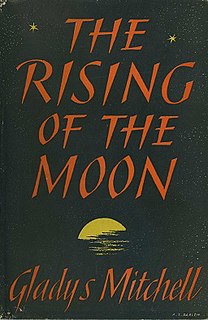
The Rising of the Moon is a 1945 mystery detective novel by the British writer Gladys Mitchell. It is the eighteenth in her long-running series featuring the psychoanalyst and amateur detective Mrs Bradley. It has been described as one of the best of Mitchell's novels.
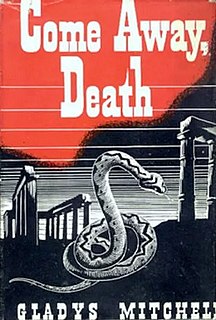
Come Away, Death is a 1937 mystery detective novel by the British writer Gladys Mitchell. It is the eight in her long-running series featuring the psychoanalyst and amateur detective Mrs Bradley. Although the plot revolves around Greek Mythology, the title is taken from a line from Shakespeare's Twelfth Night. It was followed by a loose sequel Lament for Leto in 1971.

Laurels are Poison is a 1942 mystery detective novel by the British writer Gladys Mitchell. It is the fourteenth in her long-running series featuring the psychoanalyst and amateur detective Mrs Bradley. It was Mitchell's own favourite among her novels and has been considered her best by other critics. It introduced the character of Laura Menzies who became recurring assistant of Mrs Bradley in subsequent novels.
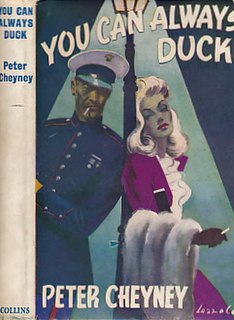
You Can Always Duck is a 1943 thriller novel by the British writer Peter Cheyney. It is the ninth in his series of novels featuring the FBI agent Lemmy Caution. The action takes place in wartime London where Caution is on the trail of a gang of black marketeers who have got mixed up in espionage. It was one of a number of films and novels of the period that made use of the booming black market for their setting.

Never a Dull Moment is a 1942 thriller novel by the British writer Peter Cheyney. It is the eight in his series of novels featuring the FBI agent Lemmy Caution. Cheyney had become known for his hardboiled style, similar to that of Raymond Chandler.

Your Deal, My Lovely is a 1941 thriller novel by the British writer Peter Cheyney. It is the seventh in his series of novels featuring the FBI agent Lemmy Caution. Much of the action takes place in wartime London. Caution is called in to investigate the disappearance of a prominent scientist.
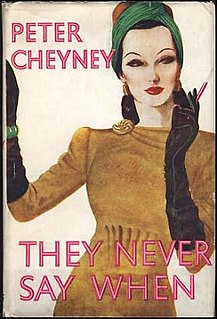
They Never Say When is a 1944 thriller novel by the British writer Peter Cheyney. It is the sixth in his series of novels featuring the London private detective Slim Callaghan, a British version of the increasingly popular hardboiled American detectives.

Uneasy Terms is a 1946 crime thriller novel by the British writer Peter Cheyney. It was the seventh and last in his series featuring the London-based private detective Slim Callaghan, a British version of the hardboiled heroes of American writing.

Sorry You've Been Troubled is a 1942 thriller novel by the British writer Peter Cheyney. It was the fifth book in his series featuring the hardboiled London-based private detective Slim Callaghan. It was published in the United States under the alternative title of Farewell to the Admiral.

You Can't Keep the Change is a 1940 thriller novel by the British writer Peter Cheyney. It is the third in his series of novels featuring the London private detective Slim Callaghan, a British version of the increasingly popular hardboiled American detectives.
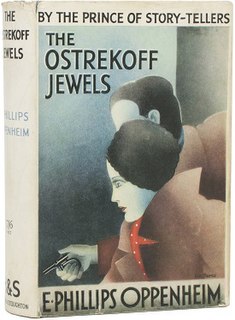
The Ostrekoff Jewels is a 1932 thriller novel by the British writer E. Phillips Oppenheim. It was published in the United States by Little, Brown.

Mystery on Southampton Water is a 1934 detective novel by the Irish writer Freeman Wills Crofts. It was the twelfth in a series of novels featuring Inspector French and takes the form of an inverted detective story, the second Crofts wrote that year after The 12.30 from Croydon. It was published in America by Dodd Mead under the alternative title Crime on the Solent.
Lynn Brock (1877-1943) was the pseudonym of the Irish writer Alister McAllister, who moved to England and wrote a series of mystery novels. Brock is best known for his series of Colonel Gore detective novels, which enjoyed popularity in the 1920s and 1930s during the Golden Age of Detective Fiction. His novels employ a complexity of style and are generally set in rural locations. He also wrote several plays under the name Anthony Wharton.
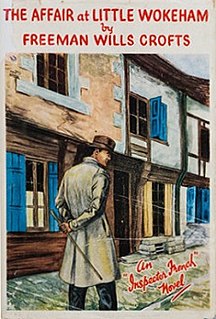
The Affair at Little Wokeham is a 1943 detective novel by the Irish writer Freeman Wills Crofts. It is the twenty fourth in his series of novels featuring Inspector French, a prominent figure of the Golden Age of Detective Fiction. It was published in the United States under the alternative title of Double Tragedy.

Antidote to Venom is a 1938 detective novel by the Irish-born novelist Freeman Wills Crofts. It is the eighteenth in his series of novels featuring Inspector French, a Scotland Yard detective known for his methodical technique. It was reissued in 2015 by the British Library Publishing as part of a group of crime novels from the Golden Age of Detective Fiction.

Found Floating is a 1937 detective novel by the Irish writer Freeman Wills Crofts. It is the sixteenth in his series of novels featuring Inspector French, a Scotland Yard detective of the Golden Age known for his methodical technique.

The Box Office Murders is a 1929 detective novel by the Irish-born writer Freeman Wills Crofts. It is the fifth in his series of novels featuring Inspector French, a prominent figure of the Golden Age of Detective Fiction. It was published in the United States the same year by Harper under the alternative title The Purple Sickle Murders.

Death at Breakfast is a 1936 detective novel by John Rhode, the pen name of the British writer Cecil Street. It is the twenty third in his long-running series of novels featuring Lancelot Priestley, a Golden Age armchair detective. It received a negative review from Cecil Day-Lewis, writing as Nicholas Blake in The Spectator noting "Some attempt is made to establish the character of the victim, but the remaining dramatis personae are stuffed men".

Death in the Hopfields is a 1937 detective novel by John Rhode, the pen name of the British writer Cecil Street. It is the twenty fifth in his long-running series of novels featuring Lancelot Priestley, a Golden Age armchair detective. It was published in America by Dodd Mead under the alternative title The Harvest Murder.



















